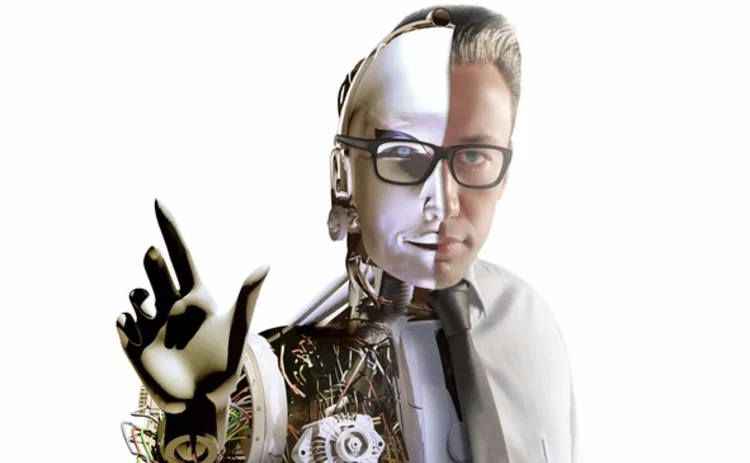Resistance Is Futile: Robots' Takeover of Human Race Inevitable
Humans have two options: Evolve or go extinct.

Speculation about the impact of artificial intelligence is a near daily occurrence, which means it’s hard for someone to truly move the needle when they make some type of prediction regarding the technology. However, there are a handful of people who will always be able to grab the public’s attention when discussing innovative technology and how it will affect our future.
On the top of that list is Elon Musk. When the co-founder of Tesla speaks, people listen. It seems every public speech Musk makes is followed shortly thereafter by a plethora of headlines about his latest proclamation. There is even a site dedicated to “Shit Elon Says,” which also doubles as its URL.
AI Is Coming
While I like to poke fun at Musk, I understand he’s a smart guy. He has probably forgotten twice as much information as I’ve learned in my lifetime. Yet something he said while speaking at the World Government Summit in Dubai this week made me raise my eyebrows, which isn’t an easy thing to do if you’ve seen my headshot.
As first reported by CNBC, Musk spoke about the future of artificial intelligence and its relationship with humans as it continues to improve.
“Over time I think we will probably see a closer merger of biological intelligence and digital intelligence,” Musk said.
There have been plenty of television shows and movies that have predicted humans’ integration with technology, resulting in some kind of cyborg. However, they are just that: movies and television shows. How practical is it that humans will need to evolve to the point where they actually merge with AI technology?
It is worth nothing Musk didn’t say this trend will start tomorrow. He said the first big disruption the technology will cause for humans is around autonomous cars, a point many would agree with. Still, envisioning a world where humans and AI need to be intertwined seems like a bit of a reach, even in the distant future.
Tough Fit
Musk’s explanation of how this might work, according to the story, is a bit vague.
“Some high-bandwidth interface to the brain will be something that helps achieve a symbiosis between human and machine intelligence and maybe solves the control problem and the usefulness problem,” said Musk.
To be honest, I’m not quite sure what he means by this. Are we talking about sending waves directly to the human brain that will allow it to operate like a computer and process information quickly? I have no idea how practical that type of technology is, but it at least seems plausible compared to actually implementing hardware into someone’s brain, which is the other way you could interpret that quote.
Call me old fashioned, but I’m not interested in having a computer chip plugged directly into my brain. What happens if the hardware needs to be replaced? What if there is a bug in the software? What if it gets hacked?
Granted, if you went back in time 100 years and told someone about the technology innovations we have today, you’d probably elicit a similar reaction of disbelief from them. But something about actually putting the technology inside someone’s brain seems like a bridge too far.
Like I said before, it’s not like Musk is saying we’re going to start creating this super race of half-human, half-AI people starting tomorrow. In fact, if I were a betting man, I’d say it’s later rather than sooner. Artificial intelligence has made some massive strides in recent years, but we’ve still got a long way to go. Look no further than Microsoft’s recent AI project “Tay.”
The company launched a Twitter account back in March 2016 that was meant to interact with 18- to 24-year-olds and learn from its conversations with users. It only took a day for it to start tweeting racist statements before being shut down. And while it seemed like the account was intentionally targeted, the fact remains it’s not the type of technology one would probably want in their brains.
Still, if you’re the owner of an auto plant that has a group of workers looking to unionize right before you have plans to scale up your operations, implementing a chip in people’s heads that can be programmed might not seem like a bad idea.
Only users who have a paid subscription or are part of a corporate subscription are able to print or copy content.
To access these options, along with all other subscription benefits, please contact info@waterstechnology.com or view our subscription options here: http://subscriptions.waterstechnology.com/subscribe
You are currently unable to print this content. Please contact info@waterstechnology.com to find out more.
You are currently unable to copy this content. Please contact info@waterstechnology.com to find out more.
Copyright Infopro Digital Limited. All rights reserved.
As outlined in our terms and conditions, https://www.infopro-digital.com/terms-and-conditions/subscriptions/ (point 2.4), printing is limited to a single copy.
If you would like to purchase additional rights please email info@waterstechnology.com
Copyright Infopro Digital Limited. All rights reserved.
You may share this content using our article tools. As outlined in our terms and conditions, https://www.infopro-digital.com/terms-and-conditions/subscriptions/ (clause 2.4), an Authorised User may only make one copy of the materials for their own personal use. You must also comply with the restrictions in clause 2.5.
If you would like to purchase additional rights please email info@waterstechnology.com
More on Emerging Technologies
Tape bids, algorithmic trading, tariffs fallout and more
The Waters Cooler: Bloomberg integrates events data, SimCorp and TSImagine help out asset managers, and Big xyt makes good on its consolidated tape bid in this week’s news roundup.
DeepSeek success spurs banks to consider do-it-yourself AI
Chinese LLM resets price tag for in-house systems—and could also nudge banks towards open-source models.
Standard Chartered goes from spectator to player in digital asset game
The bank’s digital assets custody offering is underpinned by an open API and modular infrastructure, allowing it to potentially add a secondary back-end system provider.
Saugata Saha pilots S&P’s way through data interoperability, AI
Saha, who was named president of S&P Global Market Intelligence last year, details how the company is looking at enterprise data and the success of its early investments in AI.
Data partnerships, outsourced trading, developer wins, Studio Ghibli, and more
The Waters Cooler: CME and Google Cloud reach second base, Visible Alpha settles in at S&P, and another overnight trading venue is approved in this week’s news round-up.
Are we really moving on from GenAI already?
Waters Wrap: Agentic AI is becoming an increasingly hot topic, but Anthony says that shouldn’t come at the expense of generative AI.
Cloud infrastructure’s role in agentic AI
The financial services industry’s AI-driven future will require even greater reliance on cloud. A well-architected framework is key, write IBM’s Gautam Kumar and Raja Basu.
Waters Wavelength Ep. 310: SigTech’s Bin Ren
This week, SigTech’s CEO Bin Ren joins Eliot to discuss GenAI’s progress since ChatGPT’s emergence in 2022, agentic AI, and challenges with regulating AI.








